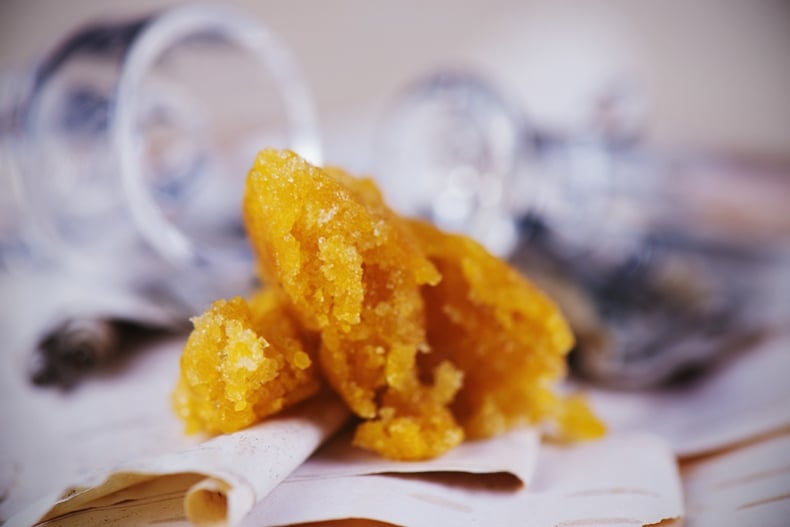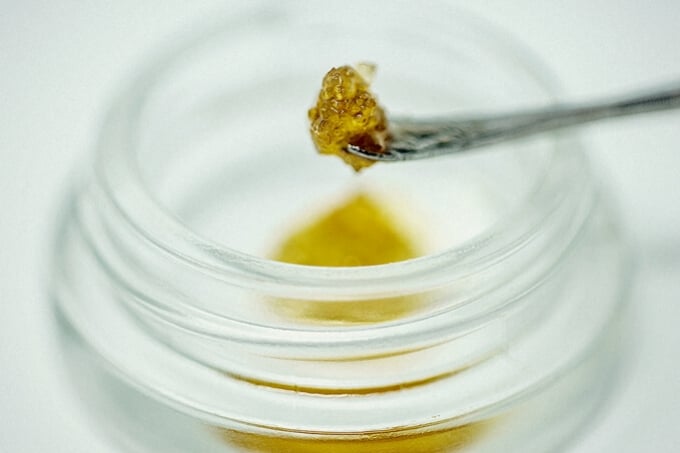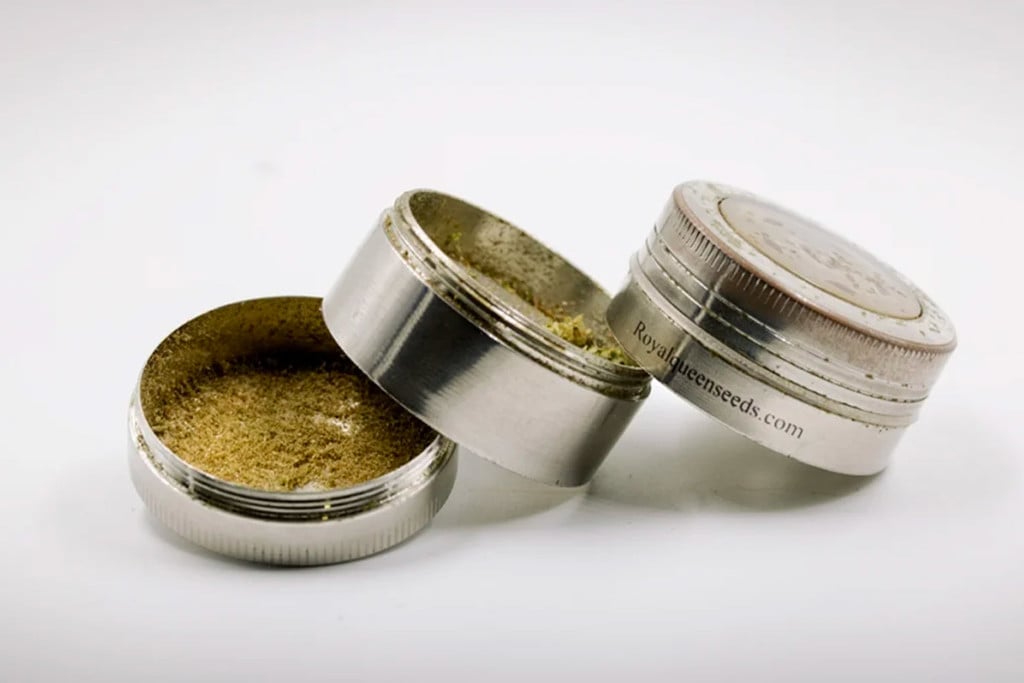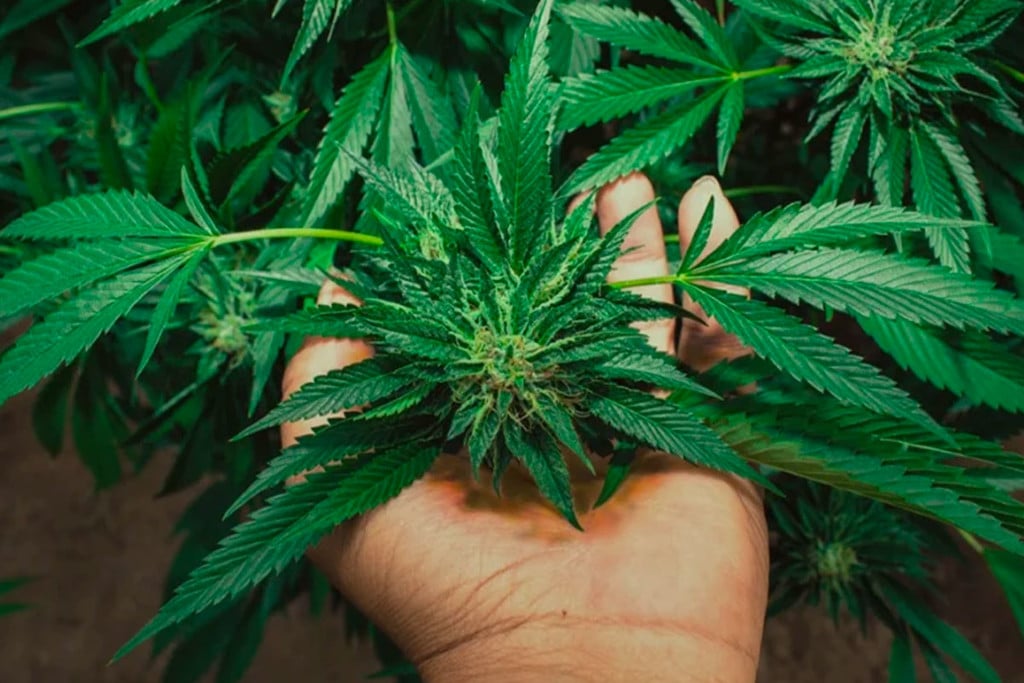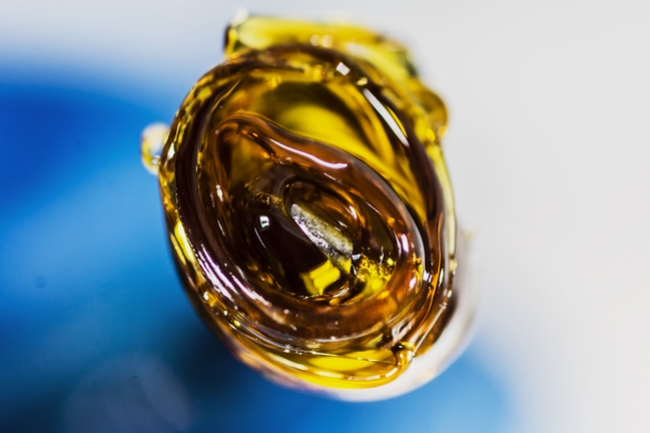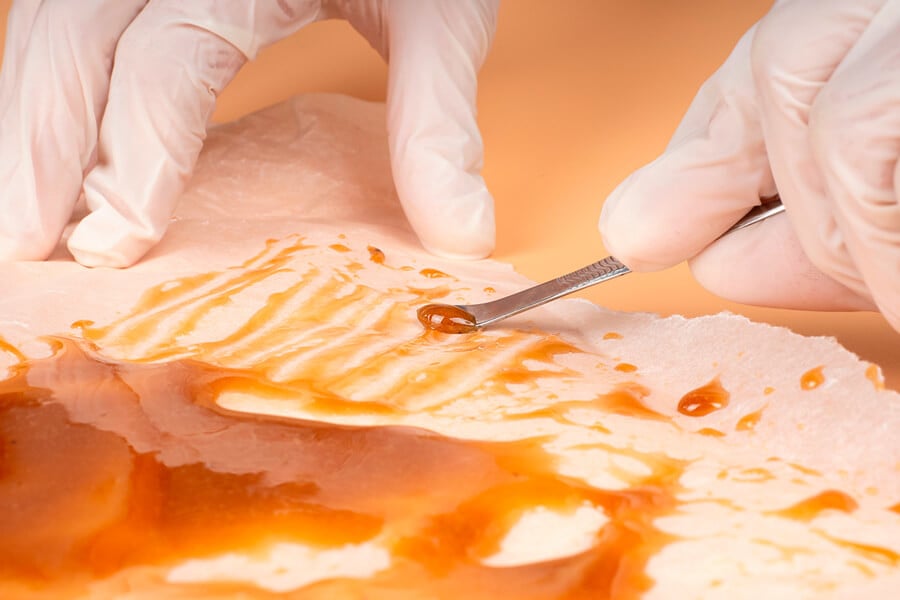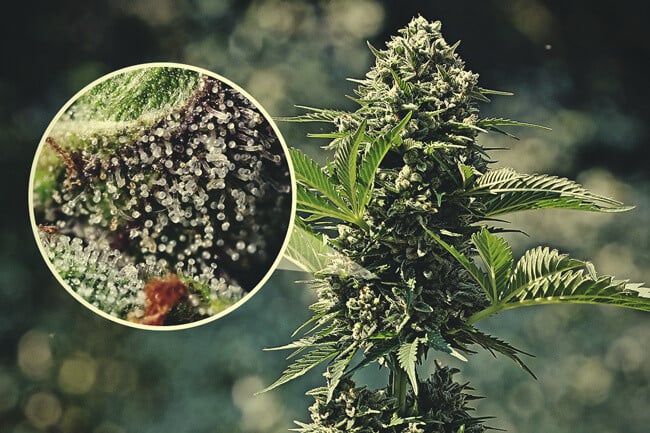.
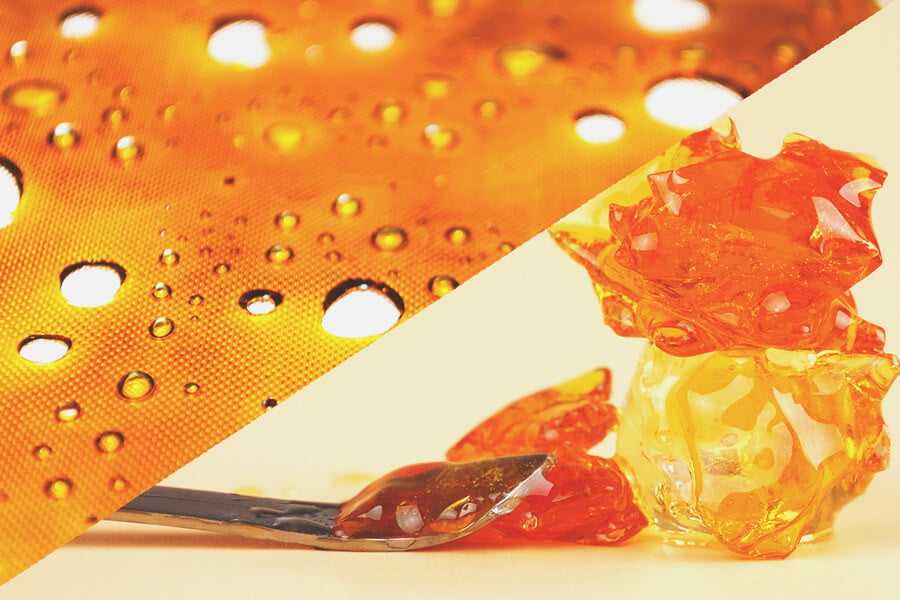
Solvent vs Solventless Cannabis Concentrates
Cannabis extracts can be made with or without solvents. In this article, we explore both solvent and solventless extracts to see what each has to offer.
From hash and kief to budder and wax—cannabis concentrates are rising, offering expert smokers access to a whole new world of aromas, flavours, and effects. In this article, we'll help you better understand the budding world of weed extracts by shining a light on the differences between solvent vs solventless cannabis concentrates.
Cannabis Concentrates 101 — Understanding the Basics of Weed Extraction
Cannabis extracts come in a variety of textures, from brittle shatter to sticky wax. Besides their texture, the aromas, flavours, and potency of weed extracts can vary depending on the strain and process used to make them. However, there is one common denominator that unites all cannabis extracts: they're all made by stripping cannabis plant material of its resinous, frosty trichomes, which contain the cannabinoids, terpenes, and other compounds known to give weed its unique effects. To do this, concentrate producers can use either solvent or solventless extraction methods.
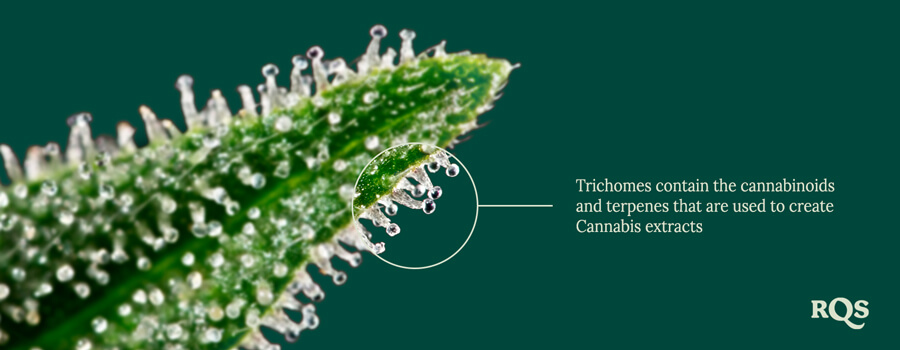
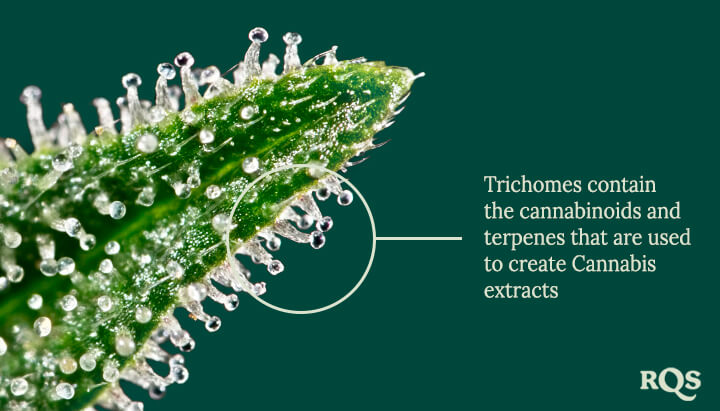
What Constitutes a Solvent in Cannabis Extraction?
At the moment, three main solvents dominate the concentrate market:
- Alcohol
- Butane
- Supercritical CO₂
When these solvents come into contact with cannabis flower or trim, they help to separate trichomes from the plant matter. In some cases, they also separate individual compounds found in the cannabis plant, allowing manufacturers to more easily isolate cannabinoids and terpenes, for example. However, because of their toxicity, some solvents (particularly butane and CO₂) need to be purged from concentrates before they can be safely consumed by humans. In markets where solvent-based extracts are legal, laws have been put into place to regulate how much solvent residue is tolerated in cannabis concentrates.
The way a solvent is purged from a concentrate can contribute to the final texture of that extract. Agitation during the purging process, for example, is what helps give budder and wax their thick consistency. Shatter, on the other hand, must not be disturbed during the purging process to produce a fine, brittle end product.
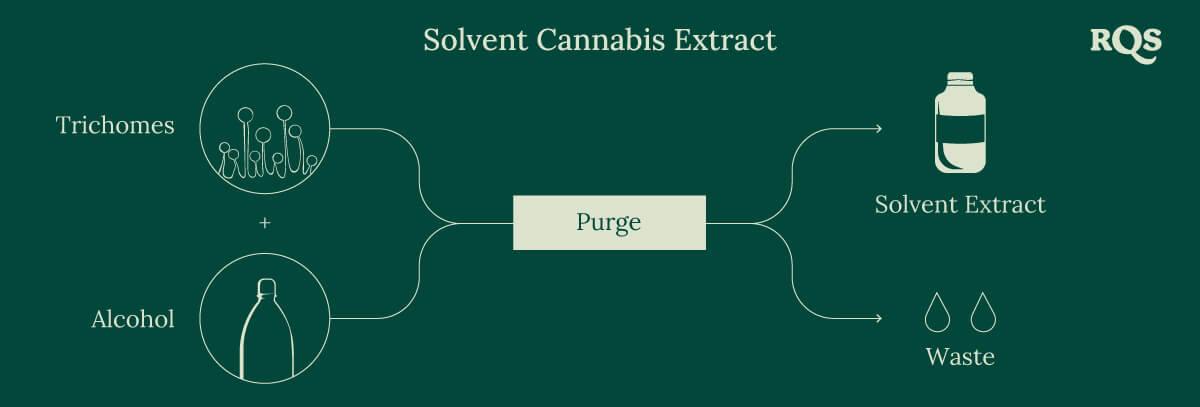
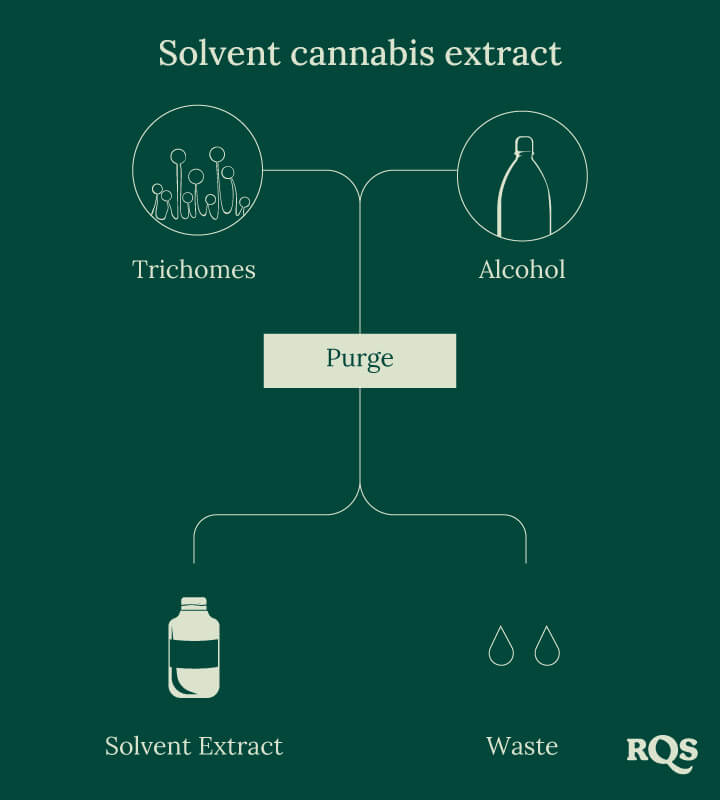
Advantages & Disadvantages of Solvent vs Solventless Extraction
Solvent extracts exist because solvent-based extraction methods hold unique advantages over more traditional, solvent-free methods. These advantages include:
- Higher yields are possible thanks to higher rates of extraction, reducing the need for manufacturers to source high-grade raw material (e.g. flower or trim)
- Cheaper end products
- Come in a wide variety of textures, from viscous oil to solid shatter
- Very precise extraction
- Simplified process for the isolation of individual plant compounds
Of course, solvent-based extraction also has numerous shortcomings, including:
- Need for expensive equipment
- Dangerous processes (such as purging) call for trained professionals and properly equipped facilities
- The use of toxic solvents, which need to be properly purged from extracts to ensure a safe end product
Solventless extraction methods also have their strengths, which is why they are still used today. These include:
- Simple and safe mechanical processes, such as dry-sifting or pressing
- More expensive and "natural" end products that come in various textures, from powdery kief to sticky rosin
- Bypasses the purging process, as solventless extraction methods typically do not use toxic chemicals
Meanwhile, some of the disadvantages of solventless extraction include:
- Lower yields due to less-efficient extraction methods
- Top-shelf raw material (flower and trim) is needed to produce high-grade solventless extracts
Solvent vs Solventless Cannabis Extracts: What You Need to Know
So, you now know the basics of how cannabis extracts are made and where/how solvents come into play in the extraction process. But what does all this mean for the end user, and what are the main differences between solvent and solventless extracts? Moreover, how do solvent vs solventless extracts stack up in terms of purity and potency?
The Main Differences Between Solvent vs Solventless Extracts
As we learned above, solvent extracts such as BHO or tinctures, for example, are made using solvent-based extraction methods. Solventless concentrates, such as hash and rosin, on the other hand, are made using mechanical extraction methods, such as ice-water extraction, dry-sifting, or pressing, and therefore do not need to be purged.
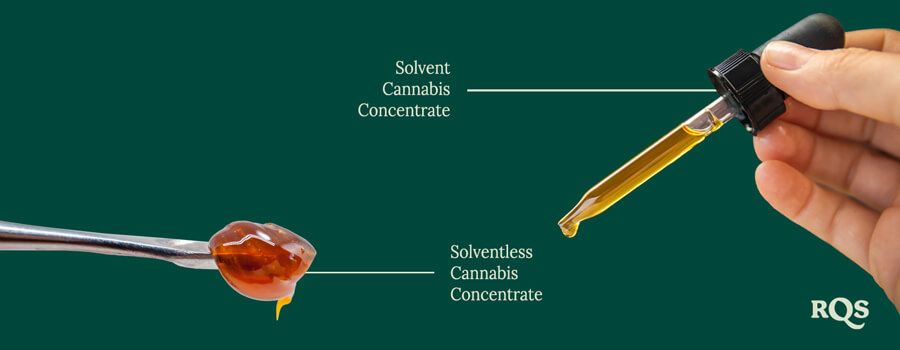
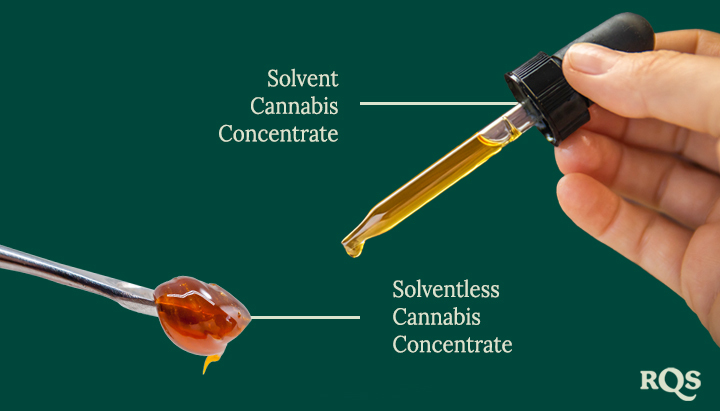
Which Extracts Are the Cleanest?
The fact that solventless extracts are made without the use of solvents often makes them appeal to health-conscious cannabis users and purists. To these users, solventless extracts offer a cleaner, purer, and less-contaminated final product. And, at first glance at least, this logic seems to ring true. However, in reality, the line separating the purity of solventless and solvent-based extracts might not be so clear-cut.
Solvents, for example, allow concentrate manufacturers to extract higher concentrations of cannabinoids and terpenes from cannabis plant matter, even when using mid-grade raw material. The BHO sold at North American dispensaries, for example, regularly tests at up to 90+% cannabinoids, whereas solventless extracts such as hash test at around 40–75%. Moreover, whereas solventless extracts such as hash, rosin, or kief often contain a mix of cannabis compounds, the use of sophisticated machinery allows solvent extract manufacturers to more easily isolate and concentrate individual cannabinoids/terpenes. Some users find the high concentration of cannabinoids and terpenes made possible by solvent extraction to be indicative of a purer end product.
Which Extracts Are More Potent?
The potency of a cannabis extract is typically determined by two main factors:
• The potency of the strain and plant material used to make the extract
• The extraction process used
Solvents greatly facilitate the stripping of trichomes from both live and cured cannabis plant material. Solvent-based extractions, therefore, typically extract much higher concentrations of cannabinoids and terpenes from plant matter than more mechanical processes. In fact, one of the main advantages of solvent-based extraction is its ability to produce great yields without having to search out the biggest, most resinous flowers (as is the case when making solventless extracts). Hence, if you’re after maximum potency, solvent extracts are definitely the way to go.
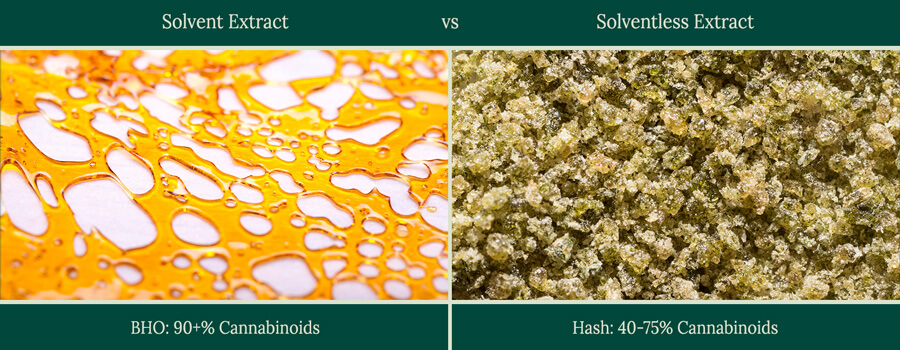
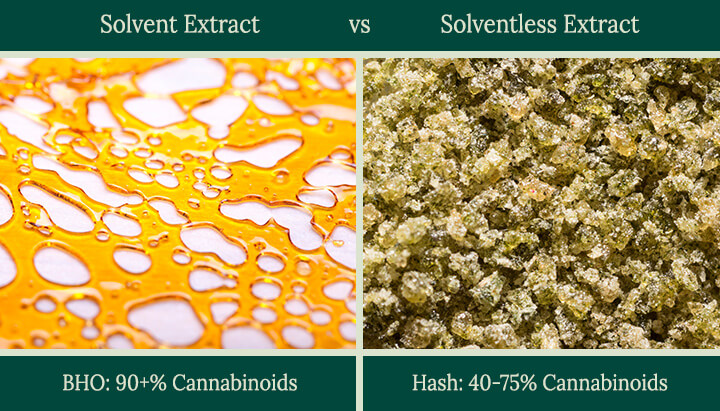
A Note on Solvent-Free Extracts
Solvent-free extracts are similar to solvent-based extracts in that they are made using solvent extraction. However, what makes solvent-free concentrates different is that they undergo a process known as distillation which helps to purge all the solvent from a concentrate. The main type of solvent-free cannabis extracts on the market today are CO₂ distillates, which are typically used in vape cartridges and pens.
Types of Solventless Extracts
There are many types of solventless extracts out there. Below we’ve broken them down into a few main categories.
Hash
Hash is arguably the world's oldest cannabis extract. It contains fine cannabis trichomes that are heated and pressed into homogenous balls or bricks for easy transportation. Some of the most iconic varieties of hash include:
- Charas or temple balls: These hash varieties originate from South Asia and are made by rubbing live cannabis flowers between the hands, causing the resin to stick to the palms, forming a black tar-like substance that is pressed together and rolled into balls or cylinders. Some famous charas varieties include Nepalese temple balls and Indian Malana Cream.
- Dry-sift hash: Originating from the Middle East and Africa, dry-sift hash is made by sifting dry cannabis flowers over sieves to separate and collect kief (a fine powder containing mainly trichomes) which is then heated and pressed into bricks. Some famous dry-sift hash varieties include Red Lebanese and Afghan Black.
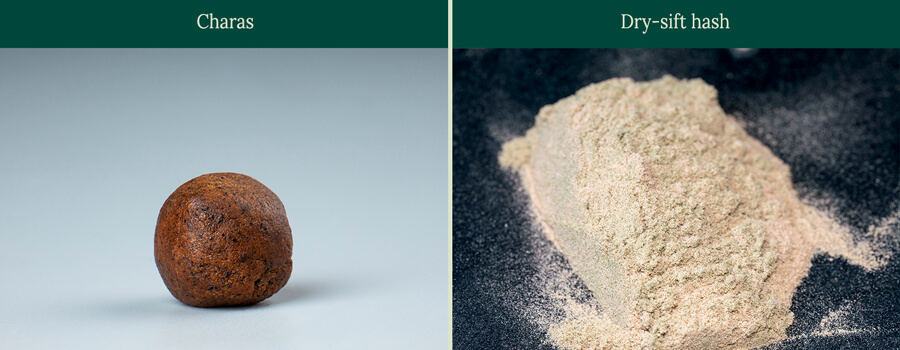
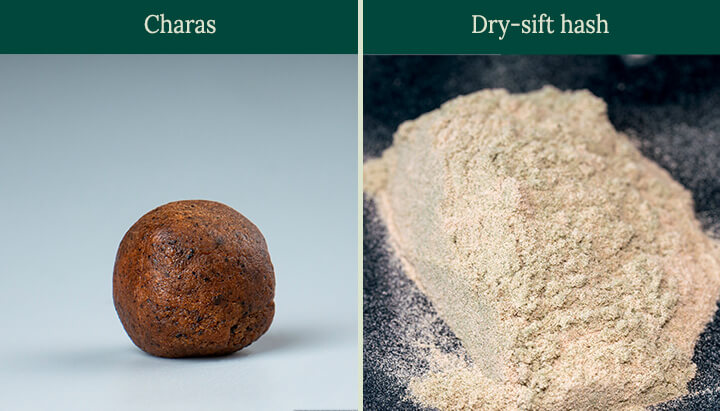
Ice Water/Bubble Hash
Ice water hash can be made from flash-frozen fresh or cured cannabis flowers. The buds are mixed and agitated in ice water to help separate the trichomes from the rest of the plant material. The result is a fine, crystalline powder similar to kief, though with a more sugary appearance. Bubble hash is the same as ice water hash, and gets its name from the bags (called bubble bags) used to filter the trichomes from the frozen flowers.
Rosin
Rosin can also be made from both freshly harvested and cured cannabis flowers (rosin made from fresh cannabis buds, you guessed it, is called live rosin). The buds are pressed using specialised rosin presses to create a small amount of thick, sticky sauce that's loaded with cannabinoids and terpenes. Rosin typically has a bright, golden honey-like colour, while its texture can vary from a greasy sauce to a crystalline wax or glassy shatter (often called pull ‘n’ snap).


The History of Cannabis Extraction
Cannabis' history is long and complex, with archaeological evidence suggesting it might be one of mankind's oldest crops, used for industrial purposes, as a spiritual aid and medicine, as well as to produce food. And while dabbing and BHO might be modern creations, it seems that the process of using concentrated forms of cannabis also dates back thousands of years.
Hash is commonly considered the oldest form of concentrated weed, and archaeological mentions of hash/hashish[1] date back as far as 1123 BCE. Bhang, while more of an edible than a concentrate, also has a rich and long history of use across the Indian subcontinent, along with charas and other hand-rolled extracts.
In his book Getting High: Marijuana through the Ages, historian John Charles Chasteen makes the case that hashish originated in the "medieval Muslim world" and was eaten rather than smoked (at least until the 1500s, when tobacco was first introduced to these regions). In the later chapters of his book, Chasteen explores the role hashish played in Muslim society as "the-intoxicant-not-prohibited-by-the-Qu'ran" and an alternative to fermented alcoholic beverages—a staple in the European diet (though hashish use was also criticised by Muslims).
Europeans were likely introduced to hashish in the 18th and 19th centuries through trade as well as military campaigns (like those led through Egypt by Napoleon, for example). A famous illustration of European affection for hash is Paris' famed Club des Hashischins, where the intellectual elite would indulge in hash and opium. In the 19th century, cannabis concentrates also served as a staple of medicinal practice in the New World, and were readily available at pharmacies across the US.
The Hash Explosion of the 21st Century
In recent years, the world of cannabis concentrates has exploded with new extraction methods that have given rise to a novel wave of super-potent solvent-based extracts, commonly known as dabs. In the US, for example, the market for dabs in states like Colorado, California, Nevada, Oregon, and Washington grew by over[2] 40% from 2019–2020. BHO varieties such as shatter, wax, and budder, along with terp sauces, live resin, and CO₂-extracted vape oils are among some of the most popular dabs in legal US markets.
The stark rise in popularity of modern concentrates has recreational users to explore more traditional extracts, including dry-sift hash, which is making a comeback as a staple on modern dispensary menus.
Welcome to the Wild World of Weed Concentrates
The market for cannabis concentrates is booming. From oil and shatter to wax and rosin, there's no shortage of weed extracts out there, each offering unique potencies, flavours, and aromas. Solvent extracts like BHO offer a world of differents textures as well as high concentrations of cannabinoids, terpenes, and other plant compounds for an elevated experience. Solventless extracts, on the other hand, preserve more traditional production methods and offer a chemical-free alternative without sacrificing flavour, aroma, or effects. Whether you choose solvent or solventless extracts largely comes down to your personal preferences.
DisclaimerExtracts, concentrates, and oils used for dabbing are among the strongest cannabis products available. Proceed with caution when using substances high in THC. Start with low doses and slowly increase over time to build up a tolerance to the compound.
Remember: Set and Setting will help you deal with various situations.
Stay Cultivated



























